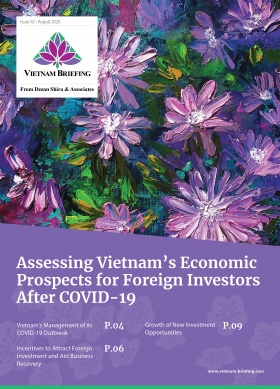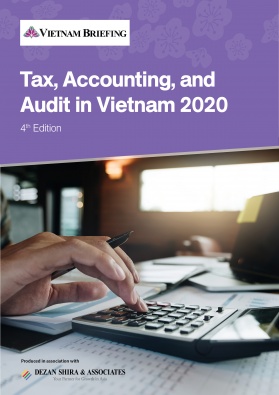Vietnam Issues Administrative Penalties for Customs Violations: Decree 128
- Vietnam recently issued new regulations outlining administrative penalties for customs violations effective December 10, 2020.
- Fines range from late submission of customs documents for tax incentive programs, automotive components, and duty-free goods.
- Import-export businesses should study the decree carefully to avoid being subject to administrative penalties brought by the new regulation.
The Vietnamese government issued Decree 128/2020/ND-CP (Decree 128) regulating administrative penalties resulting from customs violations. The regulation replaces Decree 127/2013/ND-CP and Decree 45/2016/ND-CP and will take effect on December 10, 2020. The decree introduces several new penalties and is expected to make the country’s customs protocols more conducive to international trade.
Some notable changes include the addition of new penalties related to the import-export of counterfeit goods and politically sensitive items. Business entities committing violations may be liable to additional sanctions subject to the nature and seriousness of the violation.
These sanctions empower customs to seize material evidence of violations or force the expulsion of law-breaching-goods out of Vietnam within the time limit. For the goods that are sold, dispersed, or destroyed in breach of the law, a penalty equivalent to their cost may be imposed.
Customs violations
Decree 128 encompasses several aspects of customs regulations ranging from filing for tax with illegal or incorrect documents or manipulating tax dossiers to reduce payable tax.
Delayed documentation
Failure in the timely submission of certain customs documents may qualify as a violation as per Decree 128. Such time-critical documents include the following:
- Declarations of actual payment and additional adjustments in the customs valuation;
- Application for tax-exemption on imported automobile components for manufacturing, assembly, and supporting industry; and
- Notification of bill-of-materials (BOM) for manufactured products.
Irregularities in customs declaration
False declaration of taxable imported goods, specifically in terms of quantity, name, type, quality, customs value, origin, and code, can also amount to a tax violation. Similar sanctions apply to goods imported into or exported from bonded warehouses or factories. Failure to disclose a special buyer-seller relationship that affects the customs valuation of goods also breaches the decree.
Tax declaration irregularities
Incorrect declarations that result in inadequate tax payable or an increase in exempted/reduced/refunded or uncontrolled tax amounts can attract penalties. The extent of the fine depends on whether the taxpayer can discover these irregularities before the customs department and compensate them.
A penalty of 10 percent of the difference in the tax exempted amount will apply in the self-discovery case. If customs authorities discover the violations before the additional declaration of goods, the penalty imposed will increase by 20 percent.
If goods are imported for the declared purpose of producing exported goods, not utilizing them for their intended purpose also violates this decree.
Customs inspection
The submission of finalization reports that do not comply with accounting books and customs declaration can also lead to sanctions. Other violations include not complying with inspection or audit decisions from customs authorities, sale of goods at duty-free shops without stamping “Vietnam duty not paid,” or the sale of goods prohibited or suspended from export-import at duty-free shops.
Customs supervision
Decree 128 raises the upper limit of penalty for violations in customs supervision by 33 percent. The new range of fines is between US$216 to US$345 and apply to the following acts of tax evasion:
- Disposal of scrap or defective products from export processing or production activities without notifying customs;
- The transport of goods between duty-free warehouses, duty-free shops, and aircraft without notifying or obtaining the customs authority’s consent; and
- The failure to ensure the intactness of customs or carrier seal or using a fake seal while transporting goods under customs supervision.
Other vital changes in the customs violations include introducing a new penalty for non-compliance of tariff quotas, licenses, control, standards, and import-export regulations. Additional penalties ranging from US$86 to US$432 are imposed for violation of rules on the temporary import or export of goods or mislabeled goods. The decree covers certain exceptional circumstances under which imported goods and vehicles can avail exemption from administrative penalties.
Article 16 of the decree penalizes the import-export of questionable goods or services that affects Vietnam’s security, economic, social, and diplomatic relations. Trade, transit, and transfer of goods with counterfeit Vietnamese origin will be liable to fines under Article 17.
- The new range of fines between US$2,600 (VND 60 million) to US$3,500 (VND 80 million) applies for import/export of restricted goods without legitimate licenses from the competent authorities;
- Fines between US$3,500 (VND 80 million ) to US$4,300 (VND 100 million) will apply for import or export of prohibited goods or the temporary import or export of goods where permission is no longer granted.
The government also issued Official Letter No. 7594/TCHQ-PC guiding the implementation of this decree and may issue further guiding documents on clarification and implementation.
About Us
Vietnam Briefing is produced by Dezan Shira & Associates. The firm assists foreign investors throughout Asia from offices across the world, including in Hanoi and Ho Chi Minh City. Readers may write to vietnam@dezshira.com for more support on doing business in Vietnam.
- Previous Article Warum Vietnams Aussichten für 2021 rosig aussehen
- Next Article Vietnam beschließt Arbeitsgesetzbuch für 2021






